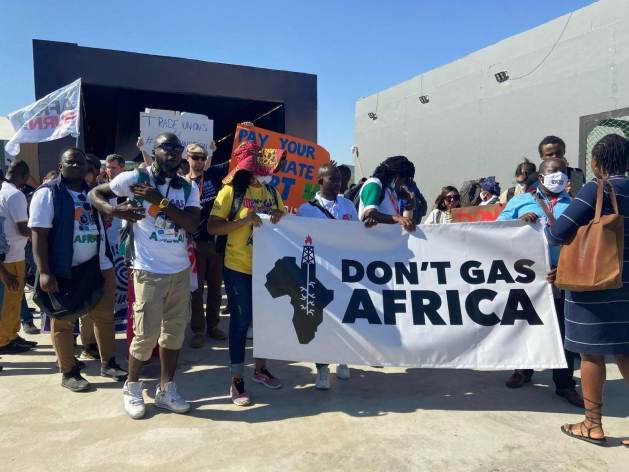ROME, Dec 14 (IPS) – One of the knock-on effects of Moscow’s invasion of Ukraine is that European countries have embarked on a ‘dash for gas’ to find alternatives to Russian energy supplies.
A flurry of deals has ensued with several African States being enticed by the prospect of lucrative energy contracts.
A new report, however, has warned that helping Europe continue its addiction to imported fossil fuels risks having devastating long-term effects for African societies.
The Fossil Fuelled Fallacy: How the Dash for Gas in Africa will Fail to Deliver Development argues the pitfalls are plentiful.
The first is that feeding the West’s fossil-fuel habit will accelerate the climate crisis, which is already having disproportionately severe effects on African communities.
Drought, wildfires, flooding, disease and pest invasions will increase in their severity and frequency with this ‘new scramble for Africa’, pushing developmental goals further out of reach.
The report, which was presented at COP27, also argues that, even if the planet were not overheating because of human-caused emissions, further facilitating the ‘dash for gas’ would not be wise.
Many African states looking to expand gas production will be building the infrastructure from scratch, so projects will take years, perhaps decades, to become operative, it says.
With renewable energy sources increasingly competitive, the projects are unlikely to benefit from the current favourable prices, so there is a risk they will not be able to operate for their entire intended lifespan, saddling African States with debts, forgone revenues and huge clean-up costs.
“African countries’ plight to help satisfy Europe’s dash for gas is a dangerous and short-sighted vision fuelled by a capitalist utopian dream that has no place in Africa’s energy future,” Dean Bhebhe, the Co-Facilitator of Don’t Gas Africa, a network of African-led civil society organisations that produced the report, told IPS .
“Investment in fossil gas production will lock Africa into another cycle of poverty, inequality and exploitation while creating a firewall for Africa to leapfrog towards renewable energy”.
The reports points out that fossil-fuel infrastructure projects do not have a good track record on combatting energy poverty and advancing development on the continent.
It gives the example of Nigeria, saying that, despite decades of fossil-fuel production, only 55% of the population had access to electricity there in 2019.
It says that jobs in fossil-fuel industries in Africa tend to be short-term, precarious, and concentrated in construction, while green jobs are longer term and have the potential to bring benefits to the entire continent, rather than just a handful of nations with fossil-fuel reserves.
Furthermore, the pollution and environmental degradation caused by expanding gas production would endanger the lives and livelihoods of many, the report says, arguing fossil-fuel infrastructure in Africa has been shown to force communities from their land and disrupt key fisheries, crops and biodiversity.
Among the examples it gives is that of the East African Crude Oil Pipeline (EACOP), which will run from Uganda to Tanzania and is set to force around 14,000 households across the two countries to move.
The report also argues that allowing high rates of foreign ownership of Africa’s energy system would pull wealth out of the continent at the expense of African citizens.
It says that any investment in fossil fuels displaces investment from clean, affordable renewable energy systems that can bring immediate benefits to African communities.
It says, for example, that the potential for wind power in Africa is almost 180,000 terawatt hours per year, enough to satisfy the entire continent’s current electricity demands 250 times over.
“As the UN Secretary General António Guterres said this year, investing in new fossil fuel production and power plants is moral and economic madness” Bhebhe said.
“New gas production would not come on-line in time to address Europe’s fossil-fuel energy crisis and would saddle the African continent with stranded assets”.
The report says that the arguments used by some African leaders and elites to justify expansion in gas production on the basis of climate justice, on the grounds that now it’s ‘own turn’ to exploit fossil fuels to deliver prosperity, are bogus.
The conclusion is that, rather than replicating the fossil-fuelled development pathways of the past,
Africa should opt for a rapid deployment of renewables to stimulate economies, create inclusive jobs, boost energy access, free up government revenues for the provision of public goods, and improve the health and wellbeing of human and non-human communities.
“We need an end to fossil-fuel-induced energy Apartheid in Africa which has left 600 million Africans without access to modern clean renewable energy,”Bhebhe said.
“Scaling up cost-effective, clean, decentralized, renewable energy is the fastest and best way to end energy exclusion and meet the needs of Africa’s people. Policymakers in Africa need to reject the dumping of dirty, dangerous and obsolete fossil-fuel and nuclear energy systems into Africa.
“Africa must not become a dumping ground for obsolete technologies that continue to pollute and impoverish”.
Freddie Daley, the lead author of the report, echoed those sentiments.
“The idea that fossil gas will bring prosperity and opportunities to Africans is a tired and overused fallacy, promulgated by those that stand to benefit the most: multinational fossil fuel firms and the elite politicians that aid and abet them,” said Daley, a research associate at the University of Sussex in the UK.
“Africa has the opportunity to chart a different development path, paved with clean, distributed, and cheap energy systems, funded by African governments and those of wealthy nations that did the most to create this crisis. We cannot let Africa get locked-in to fossil fuel production because it will lock-out Africans from affordable energy, a thriving natural world, and clean air.”
© Inter Press Service (2022) — All Rights ReservedOriginal source: Inter Press Service
Check out our Latest News and Follow us at Facebook
Original Source

